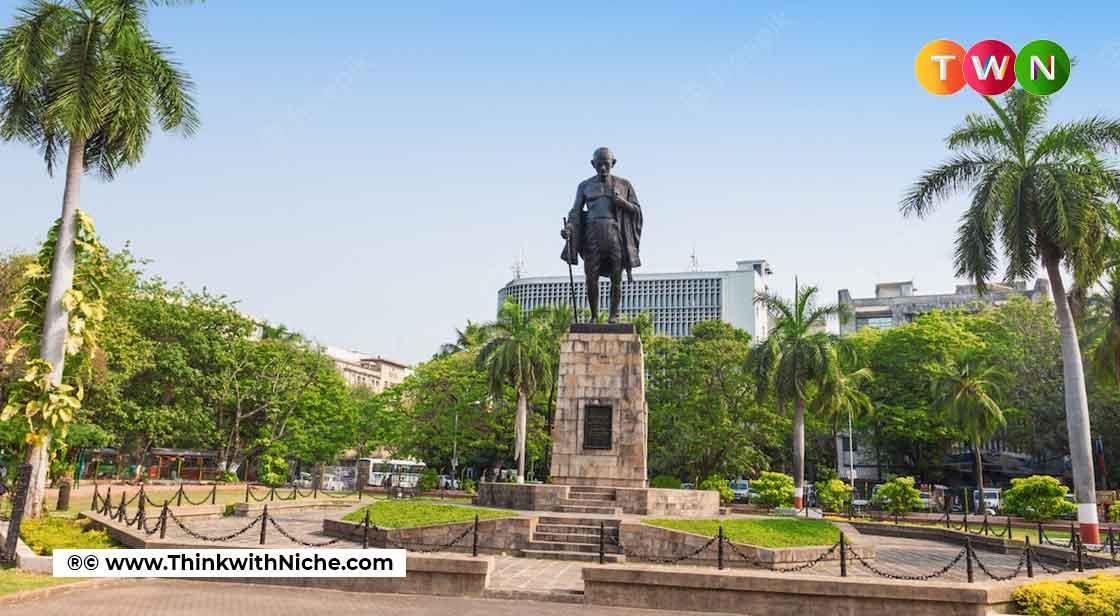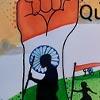Mahatma Gandhi A Great Teacher Who Taught The Ways To Live

Blog Post
Mahatma Gandhi excelled at enacting transformation. He fought for Indian rights while living in South Africa because he was against untouchability, poverty, illiteracy, and other social injustices. He also spoke up for the rights of women and those who were downtrodden. He cared deeply for all people and animals and loved the Harijans.
Throughout his entire life, he walked the road of justice and non-violence. He helped everyone and was opposed to the rigid internal barriers of caste, creed, area, religion, etc. Thus, he is referred to as the "Mahatma." Other names for him include "Bapu" and "Father of the Nation."
He was the greatest man in the entire world, not just in India. He helped promote the message of truth, love, compassion, and peace while eliminating the society's evils that plagued our society.
Mahatma Gandhi A Great Teacher Who Taught The Ways To Live so let us all attempt to learn some of his wonderful life lessons.
The name Mahatma Gandhi conjures up ideas of one man's grandeur and sacrifices for the welfare of millions. Gandhiji, Mohandas Karamchand Gandhi was born on October 2, 1869, and fought relentlessly and at great personal risk for India's independence.
People across the world adore and revere him as a representative. Not only did he labor diligently for the nation's liberation, but Mahatma Gandhi's leadership lessons have inspired generations of people. Mahatma Gandhi is often regarded as one of the world's greatest leaders. A brilliant leader, a caring human being, a model visionary, and an inspiration.
Mahatma Gandhi A Great Teacher Who Taught The Ways To Live
Let's take a quick look at the early years and background of Mahatma Gandhi before we start discussing his life lessons.
Early years and background of Mahatma Gandhi
On October 2, 1869, Mohandas Gandhi was born in the western region of British-ruled India. He was a shy kid who married Kasturbai, a girl his same age, at thirteen. Gandhi's family sent him to England in 1888 to study law after his father's passing. There, he developed an interest in the philosophy of nonviolence as it is presented in the Christian Bible's Sermon on the Mount and the Hindu holy scripture, the Bhagavad-Gita.
After passing the bar in 1891, he returned to India, but his efforts to practice law were not very successful. He accepted a job in South Africa for a year where he worked on a lawsuit since he was looking for a change of scenery.
He was active in South Africa's struggle to eradicate discrimination against the country's Indian minority, which was persecuted there by both the British and the Boers, who were descended from the area's first Dutch settlers. He had planned to stay for a year but stayed until 1914. (his wife and children had joined him, meanwhile, in 1896). In the Boer War (1899–1901), in which the British destroyed the final independent Boer republics, he led an Indian medical corps that fought on the British side. He also created the Natal Indian Congress, which promoted Indian interests.
Following the conflict, Gandhi's stature as a leader increased. He became even more ardent about his moral ideals, abstaining from, rejecting technology, and cultivating satyagraha, which is Sanskrit for "soul-force." He and his allies used satyagraha, a kind of nonviolent resistance also known as "non-cooperation," to tremendous effect against the white administrations in South Africa.
People in Gandhi's own country of India were inspired by their willingness to put up with punishment and incarceration, and eventually, the Boer and British rulers made concessions. By the time Gandhi returned to India from South Africa in 1914, he had earned a reputation as a holy figure known as a "Mahatma," or "great soul."
We celebrate Gandhi Jayanti on 2nd October every year. It is a day dedicated to promoting nonviolence via education and other public awareness efforts. let us look at some life lessons that Mahatma Gandhi taught us all.
Some Lifetime Lessons We Can Learn From Our Great Leader ‘Gandhi ji’
1. Non-Violence
“Non-violence is the greatest force at the disposal of mankind. It is mightier than the mightiest weapon of destruction devised by the ingenuity of man.” – Gandhiji
These are Gandhiji’s own words, and he explains why we should follow the road of nonviolence. One of the most important things Gandhiji taught us was to always choose the road of nonviolence. He thought that every problem could be handled without raising one's voice or resorting to violence to win conflicts.
Nonviolence, compassion, and empathy can win battles and conflicts. He remembered to maintain his resilience in difficult circumstances by staying calm, honest, and kind. Gandhi Jayanti, which falls on October 2nd, is also recognized as the International Day of Nonviolence.
2. Truthfulness
“An error does not become truth because of multiplied propagation, nor does truth become error because nobody sees it. Truth stands, even if there is no public support. It is self-sustained.” – Gandhiji.
Gandhiji demonstrated that truth alone prevails, as seen by many of his real-life experiences. He lived a truthful life, seeking the truth. The life of Mahatma Gandhi teaches individuals the importance of honesty. He did not only preach the truth, but he also lived it.
Gandhi once lied to his father when he was young and afterward regretted the action. He felt bad for hiding the truth. Later, when he apologized and revealed the truth, his father praised him for his bravery in speaking the truth.
Following Gandhi's basic concept may make a tremendous impact on how people see and treat you. Throughout his life and work, Gandhi experimented with truth and observed how it benefited and bailed him out in tough circumstances.
3. Forgiveness
“The weak can never forgive. Forgiveness is the attribute of the strong.” – Gandhiji.
Forgiveness is a virtue, and Mahatma Gandhi's famous tale about presenting his right cheek after someone smacked him on the left cheek demonstrates how forgiving Gandhiji was. He stated that “an eye for an eye simply serves to blind the entire world.” That is such a simple yet strong idea. Anger and resentment will only make you feel worse than before.
It's natural to desire revenge when one is harmed. However, Gandhiji demonstrated that vengeance or retaliation does not rectify a mistake and emphasized the need of learning to forgive. Even though Gandhi suffered greatly to restore our nation's independence, instead of taking up guns against the force, he chose the road of nonviolence and forgiveness and emerged victoriously.
4. Perseverance
“Whatever you do may seem insignificant to you, but it is most important that you do it.” – Gandhiji.
When things get tough, we frequently give up. But Gandhiji was a live example of how persistence may lead to victory. He never lost hope of achieving his idea of a free India. He never gave up until he accomplished what he set out to do. Another quality that many of us lack is perseverance.
Gandhi was unwavering in his decisions and deeds. During India's liberation struggle, Gandhi's Satyagraha demonstrated how persistence and hard effort can yield good results. Gandhi advised us not to be side-tracked by other alternatives or routes if we are unable to attain achievement in a short period. Gandhiji told us that the secret to success is to keep focused and not give up.
Also Read: Swami Vivekananda: Life Lessons From The Great Young Leader
5. Cleanliness
"Sanitation is more important than independence" – Gandhiji.
Gandhiji kept his surroundings clean and urged others to do the same. He included cleanliness and sanitation in the Gandhian way of life. His aim was for everyone to have complete cleanliness. There is more to the concept of 'Swachh Bharat' than simply keeping your surroundings clean.
Cleanliness is critical for physical wellness and a healthy environment. Everyone must learn about cleanliness, hygiene, sanitation, and the numerous diseases that are produced by unsanitary environments. “I will not let anyone walk through my mind with their dirty feet,” Mahatma Gandhi remarked. He proved that “Cleanliness is next to Godliness.”
6. Learn to Live
“Live as if you were to die tomorrow. Learn as if you were to live forever.” – Gandhiji.
This is one of Gandhiji's most inspiring quotations that may alter a person's life. The meaning of this quote is to not be afraid to live life and try new things; instead, let life be the reason you live. Gandhiji instilled in us the need for lifelong learning and the importance of savoring every minute of learning and living.
Every experience in life teaches us something new, and we must always be prepared to learn both in and out of the classroom. We must guarantee that we all take advantage of any chance to learn something new that comes our way.
7. Positivity
“Happiness is when what you think, what you say, and what you do are in harmony.” – Gandhiji.
A positive outlook on life is the key to attaining objectives and finding happiness. We may have to confront numerous difficulties and hardships in our lives. But we may learn to seek the brightening light and be optimistic. Gandhi encountered many difficult situations, but he handled them all with tenacity, always looking for the best and being steadfast in his objective of gaining independence for India.
When negative ideas arise, remember what Gandhiji once said - "A man is but the product of his thoughts. What he thinks, he becomes." So, have a cheerful attitude, and your problems will seem much less.
Conclusion
“Nothing gets much easier than to blame other people for misfortune,” Gandhiji stated, which is true because blaming others ultimately does nothing good. He believed that to change the world, one must first transform oneself. Rather than overtly blaming someone for any tragedy would never be beneficial.
Instead, one must do everything feasible for him at his level to make the world a better place to live. So, on his birthday, let us all keep his golden lessons in mind as we move forward.
You May Like
EDITOR’S CHOICE












